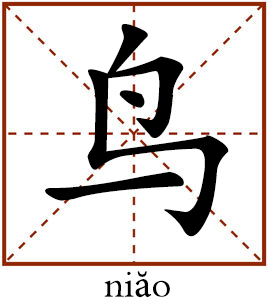Birds

The bird worship of ancient Chinese Dongyi people is deeply rooted in the worship of natural phenomena that recur periodically.
比翼鸟
bĭ yì niăo
Bi means “close together” or “side by side.” Yi refers to wings while niao mean “birds.” This idiom, taken literally, means a pair of birds flying side by side.
According to Er Ya, the first Chinese dictionary, there are birds with the name Jianjian in the south. These birds only fly in pairs. When annotating the Classic of Mountains and Rivers, Sima Zhen in the Tang Dynasty wrote that there were birds by the name Man in Chongwu Mountain. This type of bird has only one wing and one eye. Hence, they have to fly wing to wing in pairs.
This idiom is used to refer to devoted couples who keep each other company all the time. For example, the famous poem Everlasting Sorrow by Bai Juyi (772-846) includes the following verses “On high, we’d be two love-birds flying wing to wing; On earth, we’d be two trees with branches twined from spring to spring.”
不鸣则已,一鸣惊人
bù míng zéyĭ, yìmíng jīngrén
Bu means “not” while ming in this context refers to the cry of birds. Zeyi means “then that’s it.” Yiming means “once crying.” Jingren means “to astonish the world.” This idiom, taken literally, means that choosing not to call out, a bird would seem ordinary. However, once it cries for the first time, the whole world will be astonished.
According to the Records of the Grand Historian, King Wei of Qi Kingdom ignored his duty as the leader. Chunyu Kun came to ask him a riddle. “A great bird has alighted in our royal court, but for three years has neither spread its wings nor cried out. Can you guess why this is? ” “The bird may not have flown yet,” replied the king. “Once it does, it will soar to the sky. It may not have cried out yet, but once it does, it will startle everyone.” The king then changed his attitude and made great achievements in just a few years.
This idiom is used to mean that should one desire to do something, one will amaze the world with his first attempt or in a short time.
(edited by CHEN ALONG)
